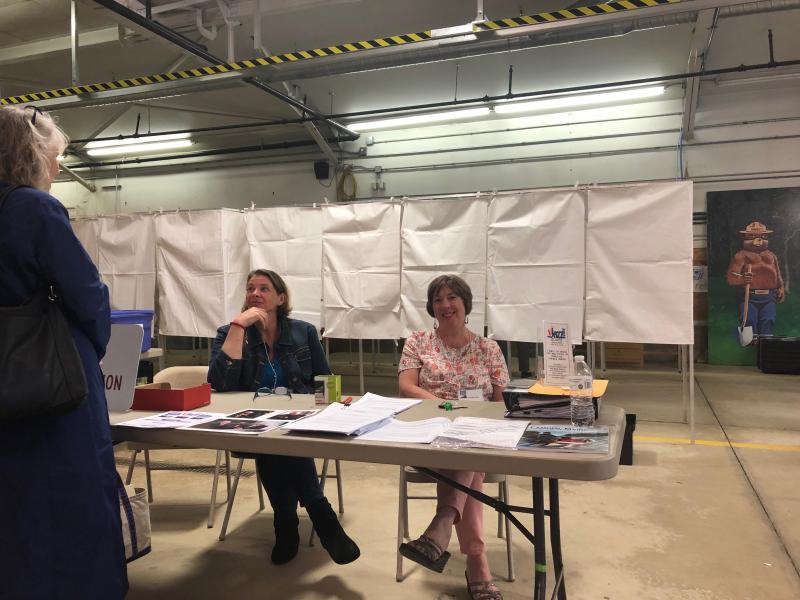Camden voters endorse new marijuana rules, littering and food ordinances
CAMDEN — The turnout was light at the polls in Camden Tuesday, June 11, with 551 b allots cast, and all the proposed municipal business was approved by a wide margin. This included the introduction of new marijuana cultivation rules, an expanded littering law, and revised rules designating where formula-based restaurants can be sited.
The Tuesday voting preceded June Town Meeting 2019, which will begin at 7 p.m. at the Camden Opera House. There, the town will consider a 2019-2020 $6 million municipal budget with a 2.5 percent increase over the current budget.
Select Board member Marc Ratner ran opposed for reelection and gathered 448 votes of endorsement.
Rebecca Flanagan was reelected to the SAD 28 and Five Town CSD school boards with 414 votes, as was Peter Orne, with 422 votes.
Lavana Snyder was elected via write-in votes for the Personnel Board,with 34 votes.
For the newly created Charter Commission, Mark Haskell was elected with 331 votes, Nancy Caudle-Johnson, with 348 votes and Christopher McLean, with 367 votes.
Robin McIntosh received 34 votes for the commission, Jim Heard, 32, and Steve Melchiskey, 57.
The town also approved the CSD budget at 403 to 115, and the SAD 28 budget, 412 to 121.
Voters also endorsed sticking with the current school budget validation process: 419 to 93 with SAD 28 and 407 to 95 for the CSD.
The warrant articles and voting results that appeared at the polls on June 11 are as follows:
Article 3: Allow Food Service in Existing Hotels in Village District
Yes: 455
No: 49
These amendments would authorize all Hotels in the Traditional Village District (Camden Harbour Inn, Norumbega Inn and Whitehall Inn),to serve the public as well as their guests within the limit described above. Permission to initially establish food service to the public will be granted only after review for a Special Exception by the Zoning Board of Appeals, including a public hearing where citizens can provide comments/concerns. Hotels currently grandfathered and already serving the public are not affected by this change as long as that practice continues.
The history of this amendment dates back a year to when current Camden development director and planner Jeremy Martin first assumed the job and got acquainted with Camden zoning. He met the owners of the Norumbega Inn, on Route 1 north, and learned that two hotels in Camden’s Traditional Village District were allowed to serve meals to the public, but the Norumbega, under existing zoning, was not.To read the proposed changes in entirety, click here.
Article 4: Marijuana Cultivation Facilities
yes: 326
no: 171
These amendments would authorize the two smallest sized indoor and outdoor marijuana cultivation (growing, harvesting, curing, grading and trimming) facilities as defined by the State of Maine. There is no part of this amendment that addresses the retail sale of marijuana.
An application to establish a marijuana cultivation facility would require Special Exception review by the Zoning Board of Appeals which includes a public hearing and a review of the Performance Standards developed to protect the general public and to mitigate potential adverse impacts on abutting properties. In addition, a Marijuana Cultivation Facility license from the town will be required. The actual licensing procedure and enabling ordinance, yet to be enacted, will be similar to other annual municipal licensing reviews and approvals.
Click here to read the entire ordinance amendment
Article 5: Formula Based Food Service
Yes: 445
No: 92
These amendments would prohibit large chain restaurants from locating in Downtown Business Districts and limit their location to a single district, the B-2, where Camden's only Formula-Based Food Service is located. The current existing Ordinance provisions allow chain restaurants of any size to locate in any of the Districts where a Restaurant is presently a permitted use.
The genesis of these amendments rests on a 2009 bid to establish a Dunkin’ Donuts in downtown Camden. General opposition to that business proposal lead to an intention to craft rules against food chains establishing storefronts in the downtown, but that did not happen.
Article 6: Local Food Sovereignty Ordinance
Yes: 458
No: 80
Consistent with the Maine Food Sovereignty Act and Home Rule Authority, this ordinance amendment would allow direct transactions of locally prepared food products between the producer and the consumer without requiring State of Maine licensing or inspections of the home-based or farm-based kitchens where the food was prepared. This Ordinance is not applicable to any meat, seafood, or poultry products.
Camden, like other towns in the region, are proposing local food sovereignty ordinances. The trend is grass-roots in origin, and reflects Maine’s independent streak to produce and sell homegrown and homemade products without excessive bureaucracy. But, as towns craft their local ordinances, they also are cognizant of public health and safety considerations.
Local food sovereignty ordinances follow the state’s 2017 adoption of the first-in-the-nation Act To Recognize Local Control Regarding Food Systems.Click here to read the entire ordinance.
Article 7 - Clean Community Ordinance
Yes: 506
No: 31
This ordinance reflects the ongoing Camden discussion about litter, from cigarette butts to alcohol shot bottles and other trash and debris. A vote in favor amends the Camden Police Ordinance to provide for the uniform prohibition of littering in its many forms throughout the Town.
The ordinance amendment also proposes fines to impose on the public for violating the rules.
The rules prohibit dropping, discarding or disposing of litter in town; trash from being blown off the backs of trucks going to the transfer station; debris from being scattered at construction sites; pet waste left behind on public and private property; illegal dumping; and certain kinds of balloon releases.
Event Date
Address
United States





























